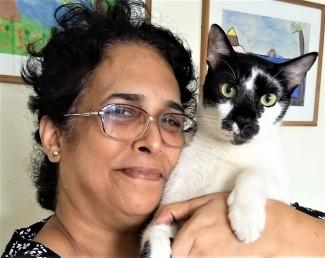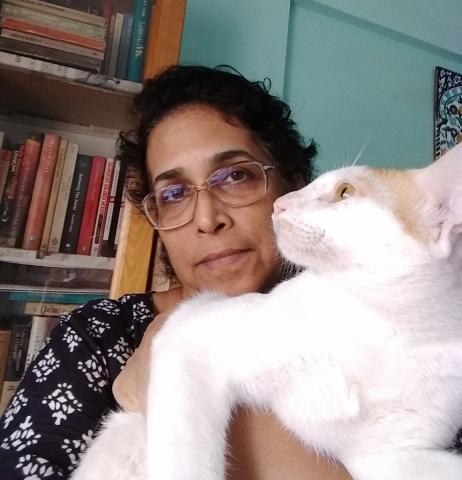
Vidya Heble has been a journalist for more than 30 years, and now writes and edits from her home near Mumbai which she shares with several cats. She shares her daily battle with depression and suicidal thoughts for over a decade and the stereotypes and stigma associated with it.
Wrath and tears, that is how it started. Sadness, feelings of desperation alternating with irritability that sometimes turned to anger. The symptoms were probably attributable to mood swings till past my twenties, but I remember feeling this way more intensely from my early to mid-thirties onwards. It was understandable; my parents had just passed away within a fortnight of each other – of disparate causes – and my marriage was under stress too.
Getting divorced triggered a worsening of symptoms. I actively wanted to commit suicide, and visualised doing it. I realised at this point that I needed help, and that was when I first sought out a psychiatrist. I was living and working in Singapore at that time, and the first available psychiatrist I could consult, in the hospital that I walked into, was a source of immense reassurance.
Diagnosed with Depression
Because my symptoms were alternating between despondency and severe irritability, I had thought I might have bipolar disorder – which used to be called manic depressive syndrome. I was even finding it difficult to keep a job for an extended period. But the doctor diagnosed depression, prescribed an anti-depressant, and suggested that I see a counsellor. It was a great relief to talk to her, and a few years later I had another much more intense and beneficial session with her.
The antidepressant, contrary to the first and immediate reaction from everyone who hears about it, has not had any side-effects*. On the contrary, it has helped me feel “normal” in terms of not feeling out of control of my emotions. I feel everything; in no way am I “numb”; but I don’t get the sense of desperation and hopelessness that I used to. Another welcome benefit has been that my obsessive-compulsive impulses are also much more manageable. It may sound facile, but being able to let go and say “it’s ok, it doesn’t matter” is such a relief.
Surviving emotional blows
I was diagnosed in 2008. The psychiatrist in Singapore was optimistic that a course of the medication (escitalopram), tapering off and eventually stopping, would help me overcome it. But life has a way of springing surprises on one. Another major emotional blow was when my only brother, older than me, was diagnosed with cancer, already at an advanced stage when it was detected. I packed up and moved to Mumbai to spend whatever time I could with him and his family.
After more than two and a half years following his diagnosis, my brother passed away. I was on a maintenance dose of escitalopram then, and for several months after I lost my brother I did not experience a worsening of symptoms. But by then I had married for a second time, and unfortunately this time too things did not go well. This second breakup sparked my downslide this time. And it has not become better.
I was again fortunate to have found a reassuring psychiatrist in India who not only explained things to me, but trusted me to understand my symptoms and the rationale of his diagnosis and prescriptions. For example, he thought an anti-anxiety addition to my antidepressant could help, but it didn’t have any significant plus points, and he accepted that I don’t want to take unnecessary medication. He also aimed to bring down the dosage to nil eventually, but this has not worked.
Is this your favourite story? Share your favourite story here
Life-saving pills
I am now 52. I have lived with depression for 10 official years and more before diagnosis. It may be likely that I will take my little life-saving pill every night for the foreseeable future, but it does not bother me. I am only afraid of not having this helping hand, this crutch which enables me to function.
Without medication, I feel paralysed. At one stage when I felt it might work to reduce the dosage, a couple of weeks later I was weeping in the shower, unable to turn the water off or to stop crying. My next appointment was not due but the doctor has asked me to call or message him whenever I need to, so I sent him a message and went to see him the next day. I was back on my earlier dosage of 10mg, and though it takes about five to six days for the effect of the medication to set in (or to wear off when discontinued), the sheer relief of having help at hand was enough to make me feel better.
My symptoms, however, have worsened this year. Even on the regular dosage, I began feeling inexplicably sad, wondering what is the point of trying. I got angry at my cats once or twice. These are all the warning signs. It starts with thoughts of self-pity. Yes, I should be able to control this but the point is that I can’t. I start thinking about how much I have gone through, when all I wanted was to be happy. The sadness grows, deepens. I break down at odd times – even while eating, sometimes.
If You Are Feeling Depressed, Seek Help. Call Helpline in India, Singapore
When I began feeling like this even on my regular dose, I asked my doctor if it would help to increase it. He always asks me how I feel, and if I think the medication is working. It is comforting that he trusts me to be frank with him. He upped my dose by 5mg, and scheduled my next appointment sooner than usual so he could monitor how I was.
It has worked, much to my relief. Of course, it means that the hope of being “cured” is now distant. And it is by no means a luxury ticket. If the medicine is a crutch, I still have to put in the effort of lifting my legs and walking.
It does not help that I also suffer from insomnia. When I should be falling asleep I can’t. And when I need to – in fact, at heart I want to – get up and go about the day, all I want is to continue to sleep, hoping that no one rings the doorbell or calls me up. Facing life is the most difficult during this phase, which ranges from 8am to 11.30am and sometimes later. I often think, I wish I could sleep forever, I wish I didn’t have to wake up. Consciousness feels like an unbearable burden. Another part of me recognises this thought as the beginning of the slippery slope down. And I don’t pursue it. I get up. I make myself sit up.
Lack of Support for Depression.
Surviving depression is hard work. It is as much a fight, an active, daily engagement, as is the battle against cancer or any other disease. But there is a big difference. Other diseases are recognised, their treatment accepted. Patients suffering from them get support and sympathy. People who suffer from depression have the additional liability of a lack of sympathy and support at the least, and outright stigma at the worst.
Most people still think depression is a “mood”. Years of awareness campaigns and education by practitioners and counsellors can be negated in one stroke with thoughtless misinformation such as that put forth recently by the very government of India, no less.
- https://twitter.com/MoHFW_INDIA/status/1011454002318340096.
- https://www.indiatoday.in/education-today/gk-current-affairs/story/depression-ministry-of-health-1272268-2018-06-28.
Even those who recognise that depression is a valid illness, still have a mental block against mainstream or allopathic medication. “Try homoeopathy, try Ayurveda, try meditation”, is what I hear far too often. Worse, one hears “try doing something that makes you happy”, “go on a holiday”, that sort of thing. If it were only so easy. Going to Shimla hasn’t cured anyone’s diabetes, why would it cure depression?
Battling stereotypes and sometimes outright hostility just makes the battle that much tougher.
Lessons I have learnt
What can you take away from this?
- Be aware of your body and mind. Know your feelings, and recognise if a reaction seems out of proportion to the cause or situation.
- Be ready to ask for help if you think you may need it. Seeing a doctor does not necessarily mean that you are ill. The doctor is a trained professional, who can find out more about what’s happening.
- Work hard to stay alive. It is worth it. You have to figure out how to do this, and a counsellor can help you.
Why don’t I just chuck it, shove off the mortal coil of pain? Because, mainly, I had a very unhappy childhood and having survived that, I will not easily give up. I wanted to kill myself at least thrice when I was young, and all three attempts failed for different reasons. Now I tell myself, you haven’t come this far just to give up. Thus, I arm myself.
There are people in my life, close family who love me and whom I love. But people are tough and they will survive if I’m not there. Animals won’t. I have always loved animals, and I have acquired feline dependents whom no-one else is likely to look after the way I do. I am also pursuing a long-held dream that's now possible; but even that is not enough. It's knowing that someone (or someones) will be left helpless if you go, that keeps me here.
Primarily.
Then there are small joys and bigger ones. Music is a big one. Books. Food. Writing (the dream I mentioned). But I would say, three days out of seven, on average, I don't want to wake up. You'll see me posting and reacting, haha-ing and so on; people will meet me; but I'm sometimes close to the edge.

I’m pretty sure I won’t fall over, though. If I do, it will mean a defeat for me and a victory for the people and the circumstances which have tried to beat me down. I’ve fallen many times, picked myself up every time. This time, it’s much more difficult. I have to remind myself more often – don’t give up, and don’t give in.
I can practically hear those who are thinking, but so many people go through difficult times and they don’t succumb to depression. Well, yes – so many people consume sugar and are not diabetic; so many people lift and carry heavy things and don’t have back pain. All of us are not the same. Bodies as well as minds.
*side-effects of anti-depressants can vary from person to person






